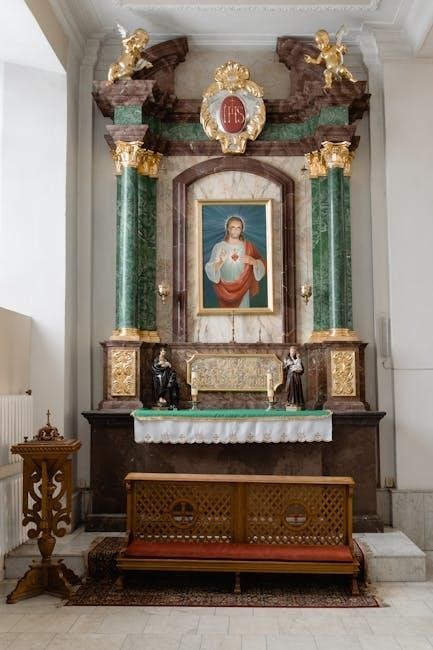The Church of God in Christ Manual serves as an essential guide, outlining the doctrine, governance, and practices of the denomination. It ensures order, unity, and integrity in worship and ministry, providing a foundational resource for spiritual growth and effective church operations.
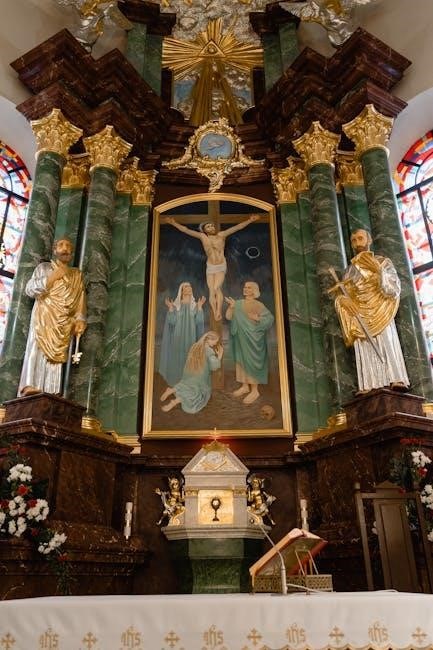
Overview of the Church of God in Christ (COGIC)
The Church of God in Christ (COGIC) is a prominent Pentecostal denomination with roots in the Holiness and Baptist traditions. Founded in 1897 by Bishop Charles Price Jones, it emphasizes the Holy Spirit’s transformative power and the importance of living a sanctified life. COGIC is known for its dynamic worship, evangelistic mission, and commitment to community service. The church operates globally, with a strong presence in the United States and international locations, fostering spiritual growth and unity among its members. Its teachings and practices are guided by biblical principles, focusing on salvation, holiness, and the empowerment of believers for ministry.
Purpose and Importance of the Manual
The Church of God in Christ Manual is a vital resource designed to maintain order and consistency in church governance, doctrine, and practices. It serves as a guide for members, leaders, and ministries, ensuring alignment with the church’s mission and values. The manual addresses ethical standards, organizational structure, and procedural guidelines, fostering unity and accountability. It also provides clarity on biblical teachings, equipping believers to live according to God’s will. By adhering to the manual, COGIC upholds its commitment to spiritual integrity, effective leadership, and the holistic development of its congregation.

Historical Background of the Church of God in Christ
Founded in 1897 by Charles Price Jones, COGIC emerged as a prominent Pentecostal denomination. The manual preserves its rich history, ensuring adherence to founding principles and fostering continued growth and unity.
Founding and Early History
The Church of God in Christ (COGIC) was founded in 1897 by Charles Price Jones, emerging from the Holiness movement within the Baptist church. The early years focused on spiritual revival, emphasizing sanctification and the baptism of the Holy Spirit. The denomination quickly grew, establishing itself as a major force in Pentecostal Christianity. The manual played a crucial role in unifying beliefs and practices, ensuring consistency across congregations. Key figures like C.H. Mason and C.P. Jones laid the groundwork for the church’s doctrine and organizational structure, shaping its identity and mission for future generations.
Key Figures and Their Contributions
C.H. Mason and C.P. Jones were pivotal in shaping the Church of God in Christ. Mason, as the first Chief Apostle, established the Pentecostal doctrine, while Jones focused on Holiness teachings. Their leadership and vision laid the foundation for the church’s growth. Mason’s emphasis on spiritual gifts and Jones’s commitment to sanctification defined COGIC’s identity. The manual reflects their contributions, serving as a unifying guide for doctrine and practice. Their legacies continue to influence the church’s mission and structure, ensuring a strong, cohesive movement rooted in their original vision and teachings.

Doctrines and Teachings of the Church of God in Christ
The Church of God in Christ upholds the Trinity, salvation through Jesus Christ, and the Holy Spirit’s transformative power. It emphasizes biblical authority, holiness, and the importance of spiritual gifts, guiding members to live a sanctified life aligned with God’s Word.
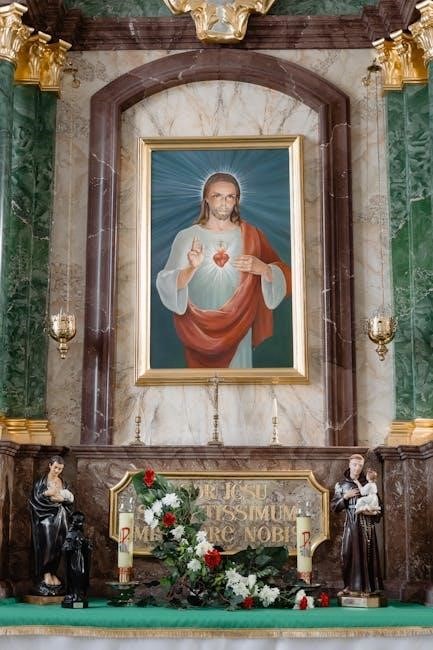
Core Beliefs and Biblical Foundations
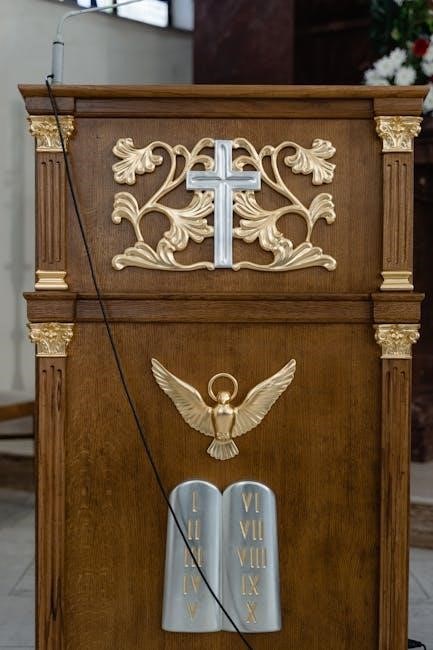
The Church of God in Christ adheres to core beliefs rooted in the Holy Bible, emphasizing the Trinity, salvation through Jesus Christ, and the empowerment of the Holy Spirit. It teaches the authority of Scripture, the necessity of repentance, and the importance of living a holy, sanctified life. Members are guided by principles of faith, love, and service, with a strong emphasis on spiritual growth and the pursuit of righteousness. These beliefs form the foundation of the church’s doctrine and practices, ensuring a steadfast commitment to the teachings of Christ and the Word of God.
Moral and Ethical Guidelines for Members
The Church of God in Christ Manual outlines clear moral and ethical standards for its members, emphasizing a life of holiness and integrity. Members are encouraged to live modestly, avoiding worldly influences that contradict biblical teachings. The guidelines promote humility, honesty, and respect for others, reflecting the church’s commitment to holy living. These principles are designed to guide members in their daily lives, ensuring their actions align with the teachings of Christ and the Bible. By adhering to these standards, members demonstrate their dedication to spiritual growth and their role as ambassadors of God’s love and truth.
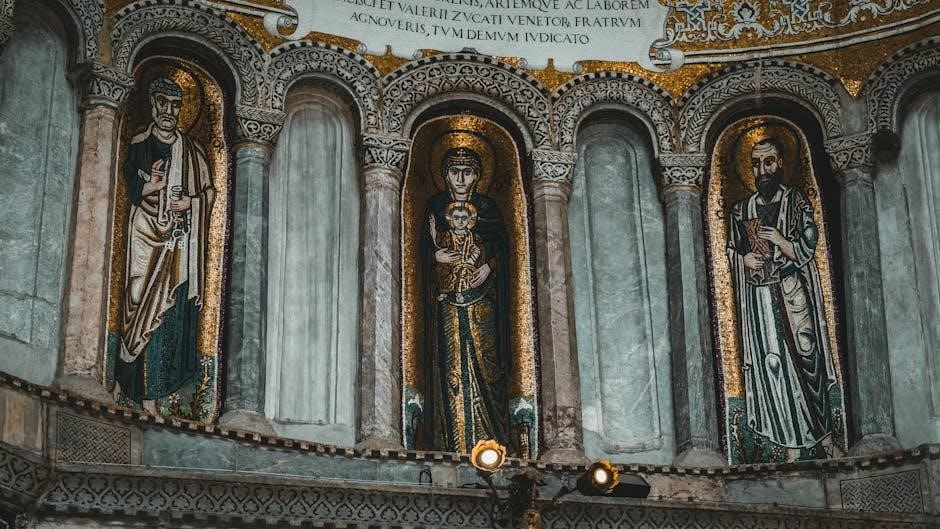
Leadership Structure in the Church of God in Christ
The Church of God in Christ has a hierarchical leadership structure, led by the Presiding Bishop, bishops, pastors, and other ordained officers, ensuring governance and spiritual guidance church-wide.
Hierarchy and Roles Within the Church
The Church of God in Christ operates under a structured hierarchy, with the Presiding Bishop at the apex, overseeing the entire denomination. Bishops are appointed to govern jurisdictions and districts, while pastors lead local congregations. Elders and ministers assist in spiritual guidance, and other officers, such as superintendents, support the leadership. This organized framework ensures unity, accountability, and effective governance. Each role is defined to maintain order and uphold the church’s doctrine, fostering a cohesive environment for spiritual growth and ministry. The hierarchy reflects a commitment to biblical principles and the advancement of the church’s mission.
Responsibilities of Pastors and Elders

Pastors and elders in the Church of God in Christ are entrusted with spiritual oversight, ensuring the flock is nourished and guided according to biblical principles. They preach, teach, and administer sacraments, fostering spiritual growth; Elders assist pastors in leadership, providing counsel and support. Both are responsible for discipleship, resolving conflicts, and promoting unity. They also oversee community outreach, ensuring the church serves the needy. Their role includes counseling members, visiting the sick, and praying for the congregation. Ultimately, pastors and elders are stewards of God’s people, upholding the church’s doctrine and fostering a culture of holiness and service.

Worship Practices and Sacraments
The Church of God in Christ practices vibrant worship, emphasizing the Holy Spirit’s presence, with music, prayer, tithing, and sacraments like baptism and communion, empowering believers.
Structure of Worship Services
The worship services in the Church of God in Christ are well-organized, beginning with praise and worship songs, followed by prayer, offerings, and a sermon. The service often includes an altar call for those seeking salvation or spiritual renewal, concluding with a benediction. This structured approach ensures a meaningful and spirit-filled experience, fostering community and spiritual growth among members.
The Role of Music and Praise in Worship
Music and praise play a central role in worship, fostering a spirit of unity and joy among congregants. The Church of God in Christ emphasizes the use of hymns, gospel songs, and liturgical dances to glorify God. This vibrant expression of worship creates an atmosphere conducive to spiritual reflection and connection with the divine, enriching the overall worship experience and deepening members’ faith and commitment to their spiritual journey.

The Church of God in Christ and Its Role in Modern Society
The Church of God in Christ actively engages in community outreach, empowering individuals through faith, education, and social justice initiatives, fostering positive change and support.
Community Outreach and Missions
The Church of God in Christ prioritizes community outreach and missions, focusing on evangelism, education, and social services. Through local and global initiatives, the church addresses poverty, health disparities, and spiritual needs. Missions emphasize spreading the Gospel, establishing churches, and supporting marginalized communities. Programs include food drives, youth mentorship, and disaster relief, reflecting the church’s commitment to serving humanity and fulfilling the Great Commission. These efforts foster spiritual growth and tangible support, embodying the church’s mission to be a beacon of hope and transformation in the world.
Addressing Contemporary Social Issues
The Church of God in Christ actively engages with contemporary social issues, advocating for justice, equality, and compassion. The manual emphasizes the church’s role in addressing systemic poverty, racial disparities, and moral decay. It encourages members to be voices of change, promoting biblical principles in society. Through education, advocacy, and community programs, COGIC empowers individuals to confront issues like inequality and injustice. The church also supports initiatives that foster reconciliation and unity, reflecting its commitment to being a transformative force in addressing modern societal challenges while remaining rooted in its spiritual mission.
The Church of God in Christ Manual remains a vital guide, ensuring spiritual growth, unity, and divine order. It continues to empower the church in fulfilling its mission.
The Enduring Relevance of the COGIC Manual
The Church of God in Christ Manual remains a cornerstone of spiritual guidance, ensuring unity and order within the denomination. Its teachings adapt to contemporary challenges while preserving foundational truths. By addressing modern issues through a biblical lens, the manual continues to empower believers in their faith journey. It serves as a timeless resource for fostering spiritual growth, moral integrity, and effective ministry. The manual’s relevance endures as it equips the church to navigate societal changes while staying rooted in its mission to spread the Gospel and serve humanity.
Final Thoughts on the Church’s Mission and Vision
The Church of God in Christ Manual underscores the denomination’s commitment to spreading the Gospel and fostering spiritual growth. Its mission emphasizes empowerment through faith, unity among believers, and impactful community engagement. The manual serves as a blueprint for achieving these goals, ensuring the church remains a beacon of hope and transformation. By adhering to its teachings, COGIC continues to inspire believers to live morally upright lives and actively serve their communities. The church’s vision of advancing God’s kingdom is realized through its unwavering dedication to biblical principles and compassionate ministry.
